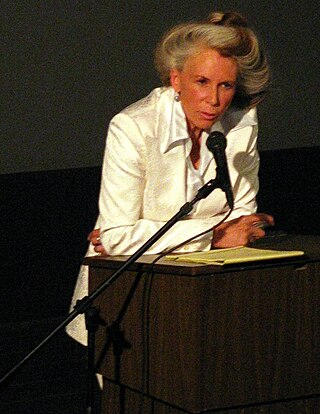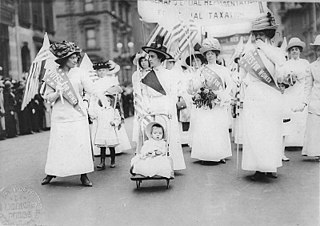Radical feminism is a perspective within feminism that calls for a radical re-ordering of society in which male supremacy is eliminated in all social and economic contexts, while recognizing that women's experiences are also affected by other social divisions such as in race, class, and sexual orientation. The ideology and movement emerged in the 1960s.

Donna J. Haraway is an American professor emerita in the history of consciousness and feminist studies departments at the University of California, Santa Cruz, and a prominent scholar in the field of science and technology studies. She has also contributed to the intersection of information technology and feminist theory, and is a leading scholar in contemporary ecofeminism. Her work criticizes anthropocentrism, emphasizes the self-organizing powers of nonhuman processes, and explores dissonant relations between those processes and cultural practices, rethinking sources of ethics.
Sex-positive feminism, also known as pro-sex feminism, sex-radical feminism, or sexually liberal feminism, is a feminist movement centering on the idea that sexual freedom is an essential component of women's freedom. They oppose legal or social efforts to control sexual activities between consenting adults, whether they are initiated by the government, other feminists, opponents of feminism, or any other institution. They embrace sexual minority groups, endorsing the value of coalition-building with marginalized groups. Sex-positive feminism is connected with the sex-positive movement. Sex-positive feminism brings together anti-censorship activists, LGBT activists, feminist scholars, producers of pornography and erotica, among others. Sex-positive feminists believe that prostitution can be a positive experience if workers are treated with respect, and agree that sex work should not be criminalized.

Catharine Alice MacKinnon is an American feminist legal scholar, activist, and author. She is the Elizabeth A. Long Professor of Law at the University of Michigan Law School, where she has been tenured since 1990, and the James Barr Ames Visiting Professor of Law at Harvard Law School. From 2008 to 2012, she was the special gender adviser to the Prosecutor of the International Criminal Court.
John Stoltenberg is an American author, activist, magazine editor, college lecturer, playwright, and theater reviewer who identifies his political perspective as radical feminist. For several years he has worked for DC Metro Theater Arts and as of 2019 is its executive editor. He has written three books, two collections of his essays and a novel. He was the life partner of Andrea Dworkin for 30 years and has lived with his husband, Joe Hamilton, for over 15 years.
Ann J. Simonton is an American writer, lecturer, media activist, and former fashion model. She founded and coordinates the non-profit group "Media Watch", which challenges what they see as racism, sexism, and violence in the media through education and action. Simonton has published two autobiographical chapters, I Never Told Anyone and Her Wits About Her. She has also written and produced two educational videos, one of which, Don't Be a TV: Television Victim, received a Silver Apple Award from the National Educational Video and Film Festival in 1995.
Sheila Jeffreys is a former professor of political science at the University of Melbourne, born in England. A lesbian feminist scholar, she analyses the history and politics of human sexuality.
The feminist sex wars, also known as the lesbian sex wars, sex wars or porn wars, are collective debates amongst feminists regarding a number of issues broadly relating to sexuality and sexual activity. Differences of opinion on matters of sexuality deeply polarized the feminist movement, particularly leading feminist thinkers, in the late 1970s and early 1980s and continue to influence debate amongst feminists to this day.

Andrea Rita Dworkin was an American radical feminist writer and activist best known for her analysis of pornography. Her feminist writings, beginning in 1974, span 30 years. They are found in a dozen solo works: nine books of non-fiction, two novels, and a collection of short stories. Another three volumes were co-written or co-edited with US constitutional law professor and feminist activist Catharine A. MacKinnon.
Nikki Craft is an American feminist activist and writer.

Feminism is aimed at defining, establishing, and defending a state of equal political, economic, cultural, and social rights for women. It has had a massive influence on American politics. Feminism in the United States is often divided chronologically into first-wave, second-wave, third-wave, and fourth-wave feminism.
Alta Gerrey was a British-American poet, prose writer, and publisher, best known as the founder of the feminist press Shameless Hussy Press and editor of the Shameless Hussy Review. Her 1980 collection The Shameless Hussy won the American Book Award in 1981. She is featured in the feminist history film She's Beautiful When She's Angry.
Feminist views on sexuality widely vary. Many feminists, particularly radical feminists, are highly critical of what they see as sexual objectification and sexual exploitation in the media and society. Radical feminists are often opposed to the sex industry, including opposition to prostitution and pornography. Other feminists define themselves as sex-positive feminists and believe that a wide variety of expressions of female sexuality can be empowering to women when they are freely chosen. Some feminists support efforts to reform the sex industry to become less sexist, such as the feminist pornography movement.
Feminism in Mexico is the philosophy and activity aimed at creating, defining, and protecting political, economic, cultural, and social equality in women's rights and opportunities for Mexican women. Rooted in liberal thought, the term feminism came into use in late nineteenth-century Mexico and in common parlance among elites in the early twentieth century. The history of feminism in Mexico can be divided chronologically into a number of periods with issues. For the conquest and colonial eras, some figures have been re-evaluated in the modern era and can be considered part of the history of feminism in Mexico. At the time of independence in the early nineteenth century, there were demands that women be defined as citizens. The late nineteenth century saw the explicit development of feminism as an ideology. Liberalism advocated secular education for both girls and boys as part of a modernizing project, and women entered the workforce as teachers. Those women were at the forefront of feminism, forming groups that critiqued existing treatment of women in the realms of legal status, access to education, and economic and political power. More scholarly attention is focused on the Revolutionary period (1915–1925), although women's citizenship and legal equality were not explicitly issues for which the revolution was fought. The Second Wave and the post-1990 period have also received considerable scholarly attention. Feminism has advocated for the equality of men and women, but middle-class women took the lead in the formation of feminist groups, the founding of journals to disseminate feminist thought, and other forms of activism. Working-class women in the modern era could advocate within their unions or political parties. The participants in the Mexico 68 clashes who went on to form that generation's feminist movement were predominantly students and educators. The advisers who established themselves within the unions after the 1985 earthquakes were educated women who understood the legal and political aspects of organized labor. What they realized was that to form a sustained movement and attract working-class women to what was a largely middle-class movement, they needed to utilize workers' expertise and knowledge of their jobs to meld a practical, working system. In the 1990s, women's rights in indigenous communities became an issue, particularly in the Zapatista uprising in Chiapas. Reproductive rights remain an ongoing issue, particularly since 1991, when the Catholic Church in Mexico was no longer constitutionally restricted from being involved in politics.
Fem is a major feminist magazine and the first Latin American one. It was published in print between 1976 and 2005, and has been digital ever since.
Rebecca Suzanne Whisnant is professor and chair of the philosophy department at the University of Dayton.

Virgínia Sofia Guerra Quaresma was the first woman to take up professional journalism in Portugal and was one of the first women graduates from the Faculty of Arts of the University of Lisbon. She was openly lesbian, in a time when society dictated that sexual orientation be hidden, and a feminist, who advocated for full equality between men and women. In her coverage of a sensational murder case in Brazil, she brought the issue of violence against women to the forefront. In the 1930s, she relocated permanently to Brazil, but traveled internationally with her work. A street was renamed in her honor in the Belém neighborhood of Lisbon, and in 2010, she was honored with a stamp bearing her likeness, along with other women.
The origins of feminism in Brazil trace back to the 19th century. During the Empire of Brazil, some jurists attempted to legalize women's suffrage, with or without the consent of the husband. Later, the republican constitution of 1891 did not exclude women from voting, because they were not considered individuals who could have rights. That made some women request, without success, their inclusion among the voters. The 1891 constitution initially had a clause that gave women the right to vote, but it was abolished in its last version because the idea that politics was not an honorable activity for women prevailed.

Feminist perspectives on sex markets vary widely, depending on the type of feminism being applied. The sex market is defined as the system of supply and demand which is generated by the existence of sex work as a commodity. The sex market can further be segregated into the direct sex market, which mainly applies to prostitution, and the indirect sex market, which applies to sexual businesses which provide services such as lap dancing. The final component of the sex market lies in the production and selling of pornography. With the distinctions between feminist perspectives, there are many documented instances from feminist authors of both explicit and implied feminist standpoints that provide coverage on the sex market in regards to both "autonomous" and "non-autonomous" sex trades. The quotations are added since some feminist ideologies believe the commodification of women's bodies is never autonomous and therefore subversive or misleading by terminology.
Katherine Ruth King, known as Katie King, is a scholar of women's studies and author. She is professor emerita in the Harriet Tubman Department of Women's Studies at the University of Maryland, College Park and author of two books: Theory in its Feminist Travels (1994) and Networked Reenactments (2011).





